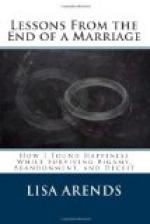The woman in such a case is apt to suffer most. Why not? She makes it the business of her life to “suffer." She prides herself on how much she has had to “suffer,” and “bear.” She cultivates her “feelings” to the limit. A man thinks it “unmanly” to give way to “feelings.” So he uses all his wits to keep from doing so, and to enable him to hide his own disappointment and make the best of life as he finds it.
A man uses his best judgment when he meets disappointment. A woman trots out her “feelings” and her best pocket-handkerchief, and calls in the neighbors. So the woman gets the lion’s share of “sympathy”—which means that all the other women get out their best handkerchiefs and try to imagine just how they would “feel” if in her place.
Of course there are exceptions. I have heard of men who wept and retailed their woes; and I have heard of women with gumption.
The woman who wrote the letter at the head of this chapter is a feel-er, not a thinker. She looks at the forlorn, bedraggled specimens of her own sex and “feels” with them, never THINKING that the women themselves have anything to do with making their conditions. She “feels” with the woman because she is a woman. Being an unthinking creature she cannot “feel” for the man at all.
Woman is the weaker creature for no other reason than that she lives in her “feelings.”
Man is the stronger for no other reason than that he uses his wits and his will to control his feelings. “B. B.” has seen children gazing into shop windows. Immediately she imagines how she would “feel” if in their places. She does not stop to THINK that in all probability the simple act of gazing into the window may bring more real joy to those children than the possession of the whole windowful of toys would bring to some rich man’s child. She does not think that life consists not in possessions or environment, but in the ability to use possessions or environment. If she were an Edwin Abbey or a Michael Angelo she would gaze on our chromo-bedecked walls and work herself up into a great state of “feeling” because we had to have such miserable daubs instead of real works of art. If she saw us gazing on an Abbey or Angelo picture she would weep tears to think we couldn’t have such pictures instead of those hideous bright chromos on our walls. It would never occur to her that we might be privately comparing her Abbeys and Angelos with our chromos, and wondering how anybody could possibly see beauty in the Abbeys and Angelos.
About nine-tenths of women’s so-called “sympathy” is just about as foolish and misplaced as that. If “B. B.” would go up and get acquainted with some of those small youngsters she sees gazing into the shop windows she would find some of her illusions dispelled. She would find among them less “longing” than she thinks, and more wonder and criticism and pure curiosity—such as she would find in her own heart if she were gazing at a curio collection.




